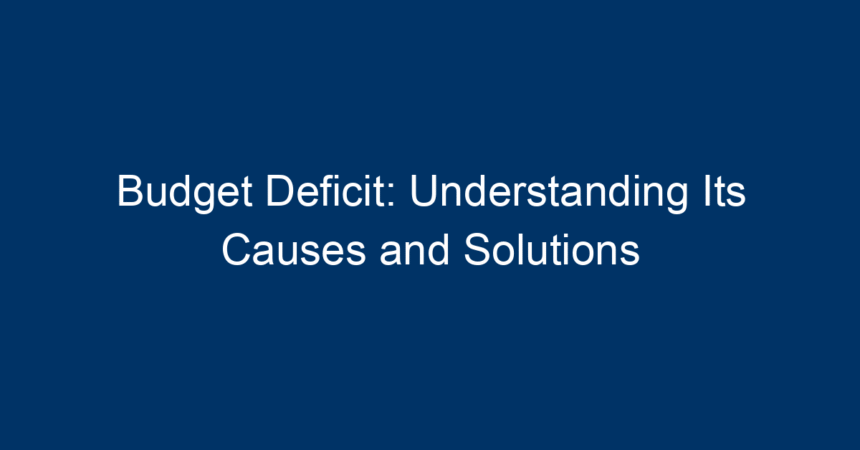In today’s economic climate, the term budget deficit is often tossed around in discussions about fiscal policy, government spending, and economic stability. For many, it conjures images of financial instability and government inadequacy. However, understanding the nuances of budget deficits can illuminate their causes and help identify viable solutions. In this article, we’ll break down the concept of budget deficits, explore their root causes, examine potential solutions, and highlight actionable insights that can make a difference.
What is a Budget Deficit?
A budget deficit occurs when an entity, typically a government, spends more money than it receives in revenue over a specific period, usually a fiscal year. This imbalance forces governments to borrow money or dip into reserves to meet expenditures. The implications of a budget deficit can be far-reaching, influencing everything from interest rates to the overall health of the economy.
How Budget Deficits Work
To appreciate the mechanics of a budget deficit, let’s look at a simplified scenario. Suppose a government has projected revenues of $3 trillion but plans to spend $4 trillion in the coming year. The resulting $1 trillion shortfall is the budget deficit. This situation can lead to increased national debt if the government chooses to borrow to cover the gap.
Causes of Budget Deficits
Understanding the causes of budget deficits is essential for grasping their complexity. While some causes are cyclical or temporary, others may be structural and deep-rooted.
1. Economic Downturns
During periods of economic downturn, tax revenues often decline due to lower incomes and profits. Governments may still need to maintain spending levels to support social programs and stimulate economic recovery, leading to a budget deficit.
2. Increased Government Spending
Policymakers often resort to increased spending in the wake of crises—be it a recession, natural disaster, or health emergency. While such investments can be necessary to stabilize the economy, they can contribute to significant budget deficits.
3. Tax Cuts
When governments implement tax cuts, revenue decreases while expenditures remain the same or even increase. The shortfall can lead to budget deficits, especially if the cuts are not paired with corresponding reductions in spending.
4. Ineffective Tax Collection
A budget deficit can often be attributed to inefficiencies or issues in tax collection. If governments struggle with enforcing tax laws or if there are significant tax loopholes, expected revenue may not meet projections.
5. Entitlement Programs
As demographics shift and populations age, entitlement programs like Social Security and Medicare can place significant financial pressure on governments. Increased demand coupled with stagnant revenue growth can exacerbate budget deficits.
Impact of Budget Deficits
Understanding the implications of budget deficits is crucial for policymakers and citizens alike.
Short-term Effects
- Increased Borrowing: Governments may need to borrow additional funds, increasing national debt levels.
- Higher Interest Rates: As the government competes with the private sector for capital, borrowing can drive up interest rates.
- Reduced Economic Growth: High levels of debt can lead to crowding out, reducing investment in the private sector.
Long-term Consequences
- Inflation Risks: Excessive borrowing can lead to inflation if the government meets deficits by printing more currency.
- Market Confidence: Persistent budget deficits can undermine investor confidence, leading to capital outflows or reduced foreign investment.
- Policy Limitations: High debt levels can limit government flexibility in responding to future economic challenges.
Solutions to Manage Budget Deficits
Addressing budget deficits requires a multi-faceted approach. Here are several strategies that can be effective:
1. Revenue Enhancement Strategies
- Tax Reform: Creating a fairer and more efficient tax system can increase revenue. Closing loopholes and ensuring proper tax collection can yield significant benefits.
- Broadening the Tax Base: Expanding the tax base by introducing new taxes or adjusting existing rates can increase overall revenue without overly burdening any particular segment.
2. Expenditure Control
- Reviewing Government Spending: Regular assessments of government programs can identify wasteful spending or areas where funds can be redirected.
- Implementing Efficiency Measures: Adopting technology and efficiency measures can lead to significant savings in handling government operations.
3. Economic Growth Initiatives
- Stimulating Growth: Focusing on policies that enhance economic growth, such as investing in infrastructure, technology, and education, can ultimately lead to higher tax revenues without increasing rates.
- Support for Small Businesses: Providing support programs and incentives for small businesses can drive job creation and economic activity, boosting tax revenues.
4. Fiscal Responsibility
- Balanced Budgeting: Area governments may consider adopting fiscal rules that require maintaining a balanced budget over the economic cycle.
- Budgetary Reforms: Modernizing budgetary processes to emphasize transparency and accountability can facilitate better financial planning.
Conclusion
Understanding the concept of a budget deficit is essential for navigating the complexities of economic policy and financial management. By dissecting its causes and impacts, we can begin to formulate effective solutions that foster fiscal responsibility and economic growth.
Actionable Insights:
- Stay Informed: Regularly follow economic reports and analyses to understand the state of your government’s budget.
- Advocate for Tax Reform: Encourage discussions about tax systems that are fair and effective, focusing on closing loopholes and enhancing tax collection.
- Support Efficiency Measures: Promote government initiatives that focus on improving the efficiency of public spending.
- Engage in Civic Dialogue: Participate in discussions about fiscal policies in your community and advocate for balanced approaches to government spending and revenue collection.
By incorporating these strategies and insights into our collective consciousness, we can better address budget deficits and contribute to healthier economic futures, ensuring that fiscal policies serve the common good.




